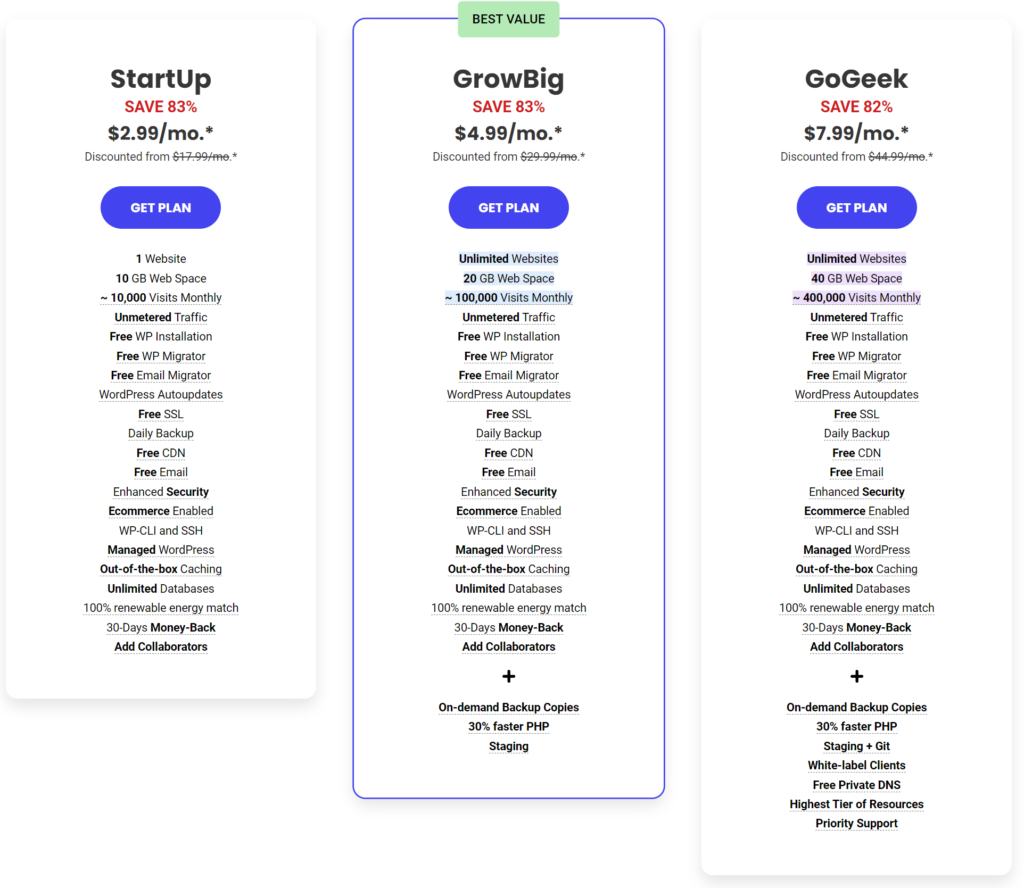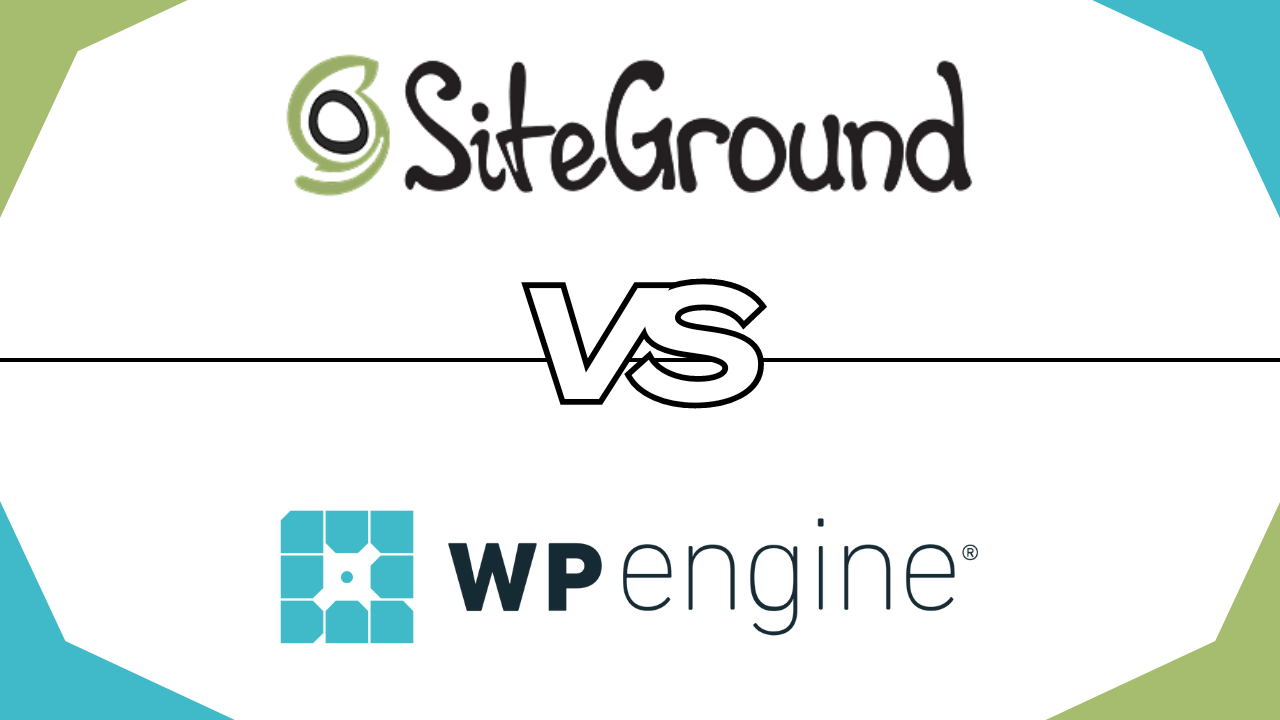
embarking on the journey to select the ideal hosting provider is a critical decision for any website owner, and the “SiteGround vs WP Engine” debate stands at the forefront of this challenge. In our in-depth blog post, we dissect these two renowned hosting services, offering a comprehensive comparison that spans from pricing models and user experience to advanced feature sets, robust security measures, and steadfast reliability. Our goal is to demystify the complexities, providing you with a clear, succinct analysis that spotlights the strengths and weaknesses of each option. Whether you’re launching a new website or mulling over a switch, our guide is crafted to streamline your decision-making process, ensuring that your choice precisely fits your unique web hosting requirements.
Table of Contents
Quick Comparison: SiteGround vs WP Engine
In a quick comparison of SiteGround vs WP Engine, key differences become apparent. SiteGround offers affordable pricing plans, making it accessible for beginners and small to medium-sized businesses. Its user interface is intuitive, and it provides a broad range of features including free SSL, email hosting, and daily backups. WP Engine, on the other hand, caters to a more specialized market with its focus on premium WordPress hosting. It offers advanced features like enhanced WordPress security, performance optimization, and expert support, albeit at a higher price point. While SiteGround is known for its versatility and value for money, WP Engine stands out for its WordPress-specific services and superior performance for larger, more demanding WordPress sites.

Photo by Studio Crevettes
Pricing Structure: Comparing Costs
When comparing SiteGround vs WP Engine, understanding their pricing structures is crucial for making an informed decision. SiteGround offers a range of affordable plans, ideal for beginners and small businesses, starting from a basic tier that’s budget-friendly. Conversely, WP Engine, known for its premium managed WordPress hosting, targets a slightly higher market segment with its starting plan. Both providers escalate costs based on advanced features, such as increased storage and bandwidth. This side-by-side price comparison highlights the value each brings, helping users choose based on their financial constraints and hosting needs. It’s important to weigh the cost against the offered features to determine which service offers the best value for your investment.
SiteGround Pricing

- SiteGround’s pricing is structured to accommodate a range of hosting needs. The entry-level StartUp plan is priced at approximately $2.99 per month, a budget-friendly option for those just beginning. For websites with moderate traffic, the GrowBig plan is available at around $4.99 per month, offering more resources. The highest tier, GoGeek, is priced at about $7.99 per month, catering to larger sites with higher traffic demands. It’s important to note that these are introductory prices, and the costs may increase upon renewal. This tiered pricing allows users to choose a plan that aligns with their website’s scale and budget.
WP Engine Pricing

- WP Engine’s pricing reflects its focus on premium, managed WordPress hosting services. The Startup plan, targeted at small websites or blogs, starts at approximately $20 per month. For growing websites or small businesses, the Professional plan is available, priced around $40 per month. Larger businesses and websites with significant traffic can opt for the Growth plan, which is about $77 per month. Additionally, WpEngine offers a Scale plan for high-traffic sites and large businesses, priced at around $600 per month. These prices represent the monthly cost when billed annually and may vary based on any additional features or services selected.
Ease of Use: Which One Is Easier To Use?

Photo by Glenn Carstens
In the debate of SiteGround vs WP Engine, ease of use is a significant factor for users, especially those new to website management. SiteGround shines with its user-friendly interface, making it straightforward for beginners to navigate. Their control panel simplifies tasks like site setup, management, and maintenance. On the other hand, WP Engine, while also user-friendly, targets users with a bit more technical know-how, offering advanced features geared towards developers. Both provide exceptional customer support, but SiteGround’s approach is slightly more accommodating for novices. Ultimately, choosing between SiteGround and WP Engine depends on your comfort level with website management tools and your specific needs.
WP Engine
- User Interface: WP Engine features a clean, modern interface designed for efficiency, catering well to both beginners and experienced users.
- WordPress-Centric Design: The platform is tailored specifically for WordPress, making it intuitive for WordPress users.
- One-Click Staging: Includes a one-click staging feature for easy testing and deployment of websites.
- Automated Backups: Provides automated daily backups, ensuring website data is secure and easily restorable.
- Developer-Friendly: While user-friendly for beginners, WP Engine is particularly advantageous for developers due to its array of advanced features.
SiteGround
- Intuitive Control Panel: SiteGround offers a user-friendly control panel, making it easy to manage hosting settings and websites.
- Simple Setup Process: The platform provides a streamlined setup process for hosting and site creation, suitable for beginners.
- One-Click Installer: Features a one-click installer for popular applications like WordPress, Joomla, and Drupal, facilitating quick installations.
- Clear Interface Navigation: The layout of SiteGround’s interface is clean and well-organized, allowing users to navigate easily.
- Helpful Site Management Tools: Includes various tools for site management, such as staging and caching, which are accessible even for those with limited technical knowledge.
In summary, SiteGround offers an intuitive, beginner-friendly interface, while WP Engine provides a WordPress-centric, developer-friendly platform with advanced features and expert support
Features: Which Has Better Features?

Photo by Muza
In assessing the features of SiteGround vs WP Engine, it’s clear that each caters to different user needs. SiteGround offers a wide range of features such as free SSL certificates, daily backups, and email hosting, making it a versatile choice for various types of users. WP Engine, on the other hand, focuses more on specialized WordPress hosting solutions like staging environments, enhanced security, and performance optimization for WordPress sites. While SiteGround appeals to a broader audience with its all-encompassing features, WP Engine stands out for WordPress users seeking dedicated, advanced functionalities. The decision hinges on whether you prioritize general hosting versatility or specific features.
SiteGround Features:
- Broad Range of Hosting Solutions: Offers shared, cloud, and dedicated hosting.
- Free Daily Backups: Ensures data safety with daily backups.
- Free SSL Certificates: Provides SSL certificates for website security.
- Email Hosting Included: Includes email hosting in its packages.
- Staging Environment: Available for testing changes before going live.
- User-Friendly cPanel: Easy-to-use control panel for site management.
- 24/7 Customer Support: Provides robust customer support round the clock.
WP Engine Features:
- Managed WordPress Hosting: Specializes in WordPress with optimized performance.
- Advanced Security Features: Offers enhanced security specifically for WordPress.
- Staging and Development Environments: Facilitates easy testing and development.
- Automated WordPress Updates: Keeps WordPress installations up to date.
- GeoTargeting: Offers GeoTargeting for personalized content.
- High-Performance Caching: Includes powerful caching for faster load times.
- Expert WordPress Support: Dedicated WordPress expert support is available.
Pros & Cons: SiteGround vs WP Engine
When comparing SiteGround vs WP Engine, each has its unique advantages and limitations. SiteGround is renowned for its affordable pricing, user-friendly interface, and a wide range of features suitable for various website needs. It’s an excellent choice for small to medium-sized websites. However, its resource limitations on lower-tier plans can be a drawback for larger sites. WP Engine, specializing in WordPress hosting, offers optimized performance, robust security features, and expert WordPress support, ideal for high-traffic WordPress sites. The downside is its higher cost and a focus that may be too narrow for those not exclusively using WordPress. Your choice should align with your specific website requirements and budget.
SiteGround Pros:
- Affordable Pricing: More budget-friendly, especially for beginners and small businesses.
- Broad Hosting Options: Offers shared, cloud, and dedicated hosting services.
- User-Friendly Interface: Intuitive control panel suitable for all user levels.
- Excellent Customer Support: 24/7 support with a strong reputation for responsiveness and helpfulness.
- Free Daily Backups and SSL Certificates: Enhances website security and data safety.
- Email Hosting Included: Provides added value with email hosting in its packages.
SiteGround Cons:
- Limited Resources on Lower Plans: The StartUp plan comes with limited web space and traffic capacity.
- Higher Renewal Rates: Introductory prices increase significantly upon renewal.
WP Engine Pros:
- Specialized WordPress Hosting: Optimized for high-performance WordPress hosting.
- Advanced Security Features: Strong focus on WordPress security.
- Expert WordPress Support: Access to WordPress experts for support.
- Staging and Development Tools: Useful for developers and advanced users.
- Automated WordPress Updates: Keeps the site secure with the latest updates.
WP Engine Cons:
- Higher Pricing: Generally more expensive, targeting a premium market.
- Specific to WordPress: Only suitable for WordPress users, not as versatile for other platforms.
- No Email Hosting: Does not include email hosting in its plans.
Alternatives
If you’re considering different options beyond SiteGround and WP Engine, there are several noteworthy alternatives in the hosting market.
Bluehost emerges as a strong contender, particularly praised for its seamless WordPress integration and cost-effectiveness, making it a great choice for startups and small businesses.
To learn more about Bluehost, we recommend that you read this SiteGround vs Bluehost

HostGator, another popular alternative, offers a variety of hosting plans that cater to both novice and advanced users, known for its scalability and reliability.

DreamHost also stands out, especially for those who prioritize strong privacy and comprehensive WordPress management features.
To learn more about DreamHost and HostGator, we recommend that you read this DreamHost vs HostGator
These alternatives present unique advantages that might align better with certain hosting requirements, offering diversity in features, pricing, and user experience compared to SiteGround and WP Engine.
Security and Reliability

Photo by Nelson
When evaluating SiteGround vs WP Engine, security and reliability are paramount factors. SiteGround excels with robust security measures like AI-driven anti-bot systems, free SSL certificates, and daily backups, ensuring a secure and reliable hosting environment. WP Engine, dedicated to WordPress hosting, offers specialized security features such as automatic threat detection and enterprise-grade firewalls, catering to the specific needs of WordPress users. Both provide uptime guarantees, with WP Engine slightly leading due to its highly optimized WordPress environment. Ultimately, while both offer exceptional security and reliability, WP Engine’s focus on WordPress-specific safeguards makes it a slightly more secure choice for WordPress sites, whereas SiteGround offers a well-rounded security approach for diverse hosting needs.
SiteGround Security:
- Robust Security Measures: Includes AI-driven anti-bot systems and free SSL certificates.
- Daily Backups: Offers daily backups to ensure data safety.
- High Uptime Guarantee: Promises a high level of uptime for website availability.
- Proactive Server Monitoring: Constant monitoring to prevent and address issues quickly.
- Free CDN and Caching: Enhances website performance and loading speed.
WP Engine Security:
- Specialized WordPress Security: Advanced security features tailored for WordPress sites.
- Threat Detection and Blocking: Automated threat detection and blocking capabilities.
- Managed WordPress Updates: Ensures WordPress sites are always up to date and secure.
- Enterprise-Grade Firewalls: Provides top-tier firewall protection.
Conclusion: SiteGround vs WP Engine Who is the Winner?
SiteGround vs WP Engine
Concluding the SiteGround vs WP Engine comparison, it’s evident that the “winner” depends on individual needs and preferences. SiteGround stands out for its affordability, user-friendliness, and versatile hosting solutions, making it ideal for a wide range of users, from beginners to medium-sized businesses.
WP Engine, however, excels in providing specialized, high-performance WordPress hosting, with advanced features suited for WordPress professionals and larger websites. SiteGround is the go-to for general hosting needs with a balance of features and price, while WP Engine is the choice for those seeking premium WordPress-focused services. Ultimately, the best choice hinges on your specific hosting requirements, budget, and whether your priority lies in general hosting versatility or specialized WordPress features.





